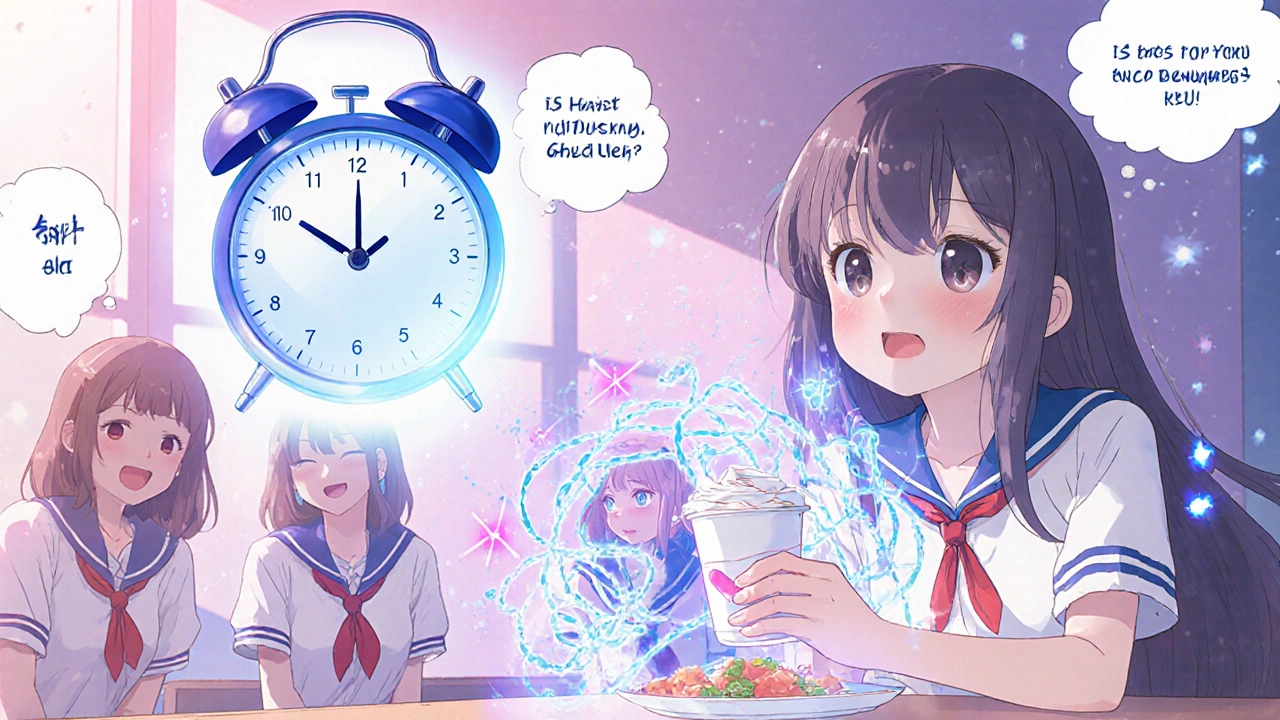Millions of people take calcium and iron supplements every day - for strong bones, to fight anemia, or just because they think it’s good for them. But what many don’t realize is that these everyday supplements can seriously mess with their prescription meds. If you’re on antibiotics, thyroid medicine, or even heartburn pills, taking calcium or iron at the wrong time could mean your treatment doesn’t work at all.
How Calcium Blocks Antibiotics
Calcium doesn’t just build bones. It also binds to certain antibiotics like tetracycline, doxycycline, and ciprofloxacin, forming a kind of chemical glue that your body can’t absorb. This is called chelation. When calcium and these antibiotics meet in your gut, they stick together and pass right through you - unchanged and useless.Studies show calcium carbonate can reduce the absorption of ciprofloxacin by up to 40%. That’s not a small drop. It’s enough to let an infection grow stronger instead of fading. If you’re on a 7-day course of antibiotics for a sinus infection or urinary tract infection, missing even one dose because of a calcium supplement could mean the difference between getting better and needing a stronger, more expensive drug later.
The fix? Don’t take calcium supplements within two hours of your antibiotic. For safety, many pharmacists recommend waiting four to six hours. That means if you take your antibiotic at 8 a.m., hold off on your calcium pill until after lunch - or better yet, until dinner. Same goes for dairy. A glass of milk with your antibiotic? Skip it. Even yogurt or cheese can interfere.
Iron and Antibiotics: A Similar Problem
Iron supplements like ferrous fumarate or ferrous sulfate behave almost exactly like calcium when it comes to antibiotics. They bind to tetracyclines and fluoroquinolones, blocking absorption. The same rule applies: keep them apart.GoodRx recommends taking iron at least two hours before or four hours after your antibiotic. That’s a tight window, especially if you’re on a twice-daily antibiotic. But here’s the thing: if you take your antibiotic at 8 a.m. and 8 p.m., and your iron at noon, you’re safe. If you take iron at 7 a.m. and your antibiotic at 8 a.m.? You just wasted both.
Parents of kids on antibiotics for acne or ear infections often struggle with this. Their child needs iron for anemia, but the doctor prescribed doxycycline. Trying to space doses around school, meals, and bedtime gets messy. That’s why it’s critical to talk to your pharmacist - not just your doctor - when both are prescribed.
Calcium and Thyroid Medicine: A Silent Saboteur
If you’re on levothyroxine for hypothyroidism, calcium might be quietly sabotaging your treatment. Levothyroxine needs to be absorbed on an empty stomach, and calcium - whether from a pill or a calcium-fortified orange juice - gets in the way.Research published in the South Medical Journal showed that taking calcium with levothyroxine cuts hormone absorption by nearly half. That means your TSH levels stay high, you still feel tired, your weight won’t budge, and your doctor keeps increasing your dose - not because your thyroid is worse, but because the calcium is blocking the medicine.
The solution? Space them out by at least four hours. Take your thyroid pill first thing in the morning, on an empty stomach. Wait four hours before taking your calcium supplement. If you take your calcium at night, that’s even better. No conflict. No guesswork. Just steady, predictable hormone levels.

Iron and Heartburn Medicines: The pH Problem
Iron needs acid to be absorbed. Your stomach makes acid naturally, but if you’re taking omeprazole, pantoprazole, famotidine, or even Tums (which contains calcium carbonate), your stomach acid drops. No acid? No iron absorption.This is a hidden trap. People take heartburn meds daily. They take iron for low iron. They assume both are fine together. But over time, their iron levels don’t improve - not because they’re not taking enough, but because the meds are shutting down the very environment iron needs to work.
Here’s what works: take your iron supplement at least two hours before your heartburn medicine. That way, your stomach still has enough acid to absorb the iron. If you’re on daily proton pump inhibitors, your doctor might need to switch you to a higher iron dose or even an IV iron infusion. Don’t assume your pills are working just because you’re taking them.
And skip the milk. HealthyChildren.org says it clearly: milk binds iron just like it binds antibiotics. Orange juice? Better. The vitamin C helps iron absorb. A small glass with your iron pill? Smart. A glass of milk? Counterproductive.
Why Timing Matters More Than You Think
It’s not just about avoiding side effects. It’s about treatment failure. A 2023 NHS report found that nearly one in five patients on iron supplements showed no improvement in blood tests - not because they were noncompliant, but because they were taking them with antacids or calcium pills at the same time.Pharmacists are trained to catch this. But most patients never mention their supplements. They think, “It’s just a vitamin.” But calcium and iron aren’t vitamins. They’re minerals with powerful chemical behaviors. And they don’t play nice with drugs.
Here’s a simple rule: if you take any supplement with calcium, iron, magnesium, or zinc, assume it interferes with your meds - unless your pharmacist says otherwise. Always ask: “When should I take this with my other pills?”
What to Do Right Now
If you’re taking any of these medications - antibiotics, thyroid medicine, heartburn pills, or blood pressure drugs - and you’re also taking a calcium or iron supplement, here’s what to do today:- Check your pill bottles. Look for warnings about “calcium,” “iron,” “antacids,” or “dairy.”
- Write down every supplement you take - even the ones you think are harmless.
- Call your pharmacist. Ask: “Do any of my supplements interact with my prescriptions?”
- Set phone alarms. If you take levothyroxine at 7 a.m. and calcium at 8 p.m., set a reminder so you don’t accidentally swap them.
- Keep a simple log: what you took, when, and if you felt any change in energy, digestion, or symptoms.
Most people don’t realize their fatigue, brain fog, or recurring infections could be caused by a simple timing mistake - not a worsening disease.
What’s Changing in 2025
Pharmacies in Australia and the U.S. are starting to flag mineral-medication risks in real time. Electronic health records now auto-alert pharmacists when a patient fills a thyroid script and a calcium supplement on the same day. Some apps even send you a push notification if you try to order iron and omeprazole together.But tech can’t replace human talk. If you’re over 50, on more than three meds, or managing a chronic condition, ask for a medication review. Pharmacists call it “Medication Therapy Management.” It’s free in many places. And it’s the best way to catch these hidden clashes before they hurt you.
Minerals aren’t the enemy. Medications aren’t the enemy. But when they meet without planning, they can cancel each other out. And that’s when health gets risky.


shubham seth
November 17, 2025 AT 11:20So let me get this straight - you’re telling me my morning iron pill and my omeprazole are having a silent war in my gut and I’m the collateral damage? 😏 I’ve been taking them together for 3 years thinking I was being efficient. Turns out I was just feeding my anemia with placebo vibes. Time to reorganize my entire pill schedule like a fucking alchemist.
Shannon Hale
November 18, 2025 AT 12:21OMG I KNEW IT. I’ve been on levothyroxine for 8 years and my TSH keeps creeping up and my doctor keeps raising my dose - turns out my ‘healthy’ calcium-fortified almond milk smoothie at breakfast was sabotaging me. I’ve been a FOOL. I just switched to taking my thyroid med at 5am and calcium at 10pm. My energy is already better. THIS IS LIFE-CHANGING. WHY DOESN’T EVERYONE KNOW THIS??
Holli Yancey
November 18, 2025 AT 13:37I appreciate this breakdown. I’ve been taking iron and antibiotics together because I didn’t want to forget - now I realize I was probably making my infection worse. I’ll call my pharmacist tomorrow and map out a schedule. Small changes, big results. Thanks for not just scaring people but giving actionable steps.
saurabh lamba
November 19, 2025 AT 14:55So... we're all just chemical puppets? 🤔 Calcium, iron, meds - it’s all just atoms fighting for dominance in our guts. Who even are we if we can't even control when we swallow a pill without triggering a biochemical coup? I feel like I'm not taking medicine... I'm just a spectator in a war I didn't sign up for.
Leslie Douglas-Churchwell
November 21, 2025 AT 00:10Let’s be real - this isn’t just about ‘timing.’ This is Big Pharma’s quiet genocide. They don’t want you to know that minerals can outmaneuver their synthetic compounds. They profit off you taking MORE pills because your ‘absorption’ is ‘compromised.’ The FDA doesn’t mandate warning labels on calcium bottles because they’re owned by the same conglomerates that make proton pump inhibitors. I’ve seen the documents. This is systemic. You’re not just ignorant - you’re being manipulated. 🕵️♀️💊
And don’t even get me started on ‘fortified’ orange juice. That’s not nutrition - it’s chemical warfare disguised as ‘health.’
Next time you take a supplement, ask: Who benefits? Not your doctor. Not your pharmacist. The shareholders.
Wake up. The system is rigged. And your gut is the battlefield.
Kiran Mandavkar
November 22, 2025 AT 14:19You people are pathetic. You take a pill, then another pill, then a third pill, then you read a 2000-word Reddit essay to figure out how not to kill yourself with your own stupidity. You don’t need timing charts - you need to stop taking supplements unless you have a documented deficiency. Your body evolved without your ‘daily iron’ nonsense. You’re not a lab rat. You’re a human. Stop overcomplicating everything.
Eric Healy
November 23, 2025 AT 05:21Bro this is why I stopped taking all supplements. I got tired of playing Russian roulette with my meds. Now I just eat spinach, eggs, and sardines. If you need a pill to be healthy you’re already doing it wrong. Also dont drink milk with antibiotics. Thats like putting a sock in your engine. Basic.
Gordon Mcdonough
November 23, 2025 AT 20:33AMERICA IS DYING BECAUSE OF THIS!!! I’ve been taking my calcium with my blood pressure med for YEARS!!! I just found out my BP readings are all over the place because of it!!! THIS IS A NATIONAL EMERGENCY!!! WHY ISN’T THIS ON THE NEWS?? I’M TAKING A GUN TO MY PHARMACIST’S HOUSE TOMORROW!!!
Deb McLachlin
November 24, 2025 AT 13:48Thank you for the comprehensive and evidence-based overview. I particularly appreciate the emphasis on consulting pharmacists, as their clinical training in drug interactions is often underutilized by patients. The recommendation to maintain a log of intake timing is excellent practice - it fosters both accountability and data-driven communication with providers. I would only add that patients on long-term proton pump inhibitors should consider periodic serum ferritin and vitamin B12 monitoring, as gastric acid suppression may have broader nutritional implications beyond iron. This is a critical conversation that should be integrated into routine medication reviews.